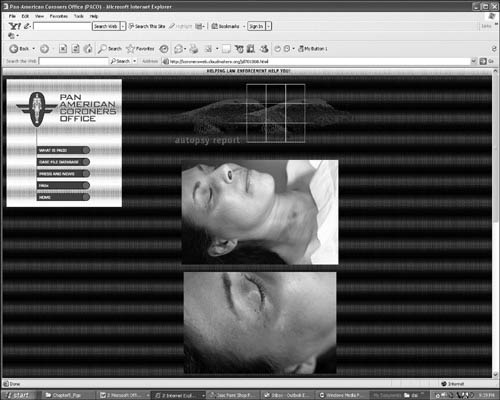Virtually true, or maybe not
Sunday | February 4, 2007 open printable version
open printable version

From DB, for once a brief blog:
Perhaps the most enduring legacy of The Blair Witch Project was the idea of promoting the film through a faux website that treated the lore around the Witch as genuine. Later, the promotion for Spielberg’s A.I. created an alternate reality game (ARG) by scattering clues to a murder among many websites. The murder wasn’t part of A.I.‘s plot, but it did take place in the film’s fictional world, and online participants pursued an elaborate para-narrative that connected obliquely to the movie. A key character in the ARG, researcher Jeanine Salla, was listed as an actor in the film’s final credits. Ms. Salla evidently died a grisly death herself, as the autopsy report above indicates. She led other lives in fanfiction and online comic strips.
Now, for The Great World of Sound, director Craig Zobel has created a website. Nothing new in that. But Zobel also provides a website for a fictional company in the film. Here’s Screen International’s take (19-25 January 2007, print ed., p. 36):
It’s the 21st century equivalent of the film within the film—the fictional website of the shark-like record company in the movie. It’s everything you’d expect from a shady music company—flashing primary colors, bad clip art, typos and scrolling fonts, all to the sound of a soul-killing MIDI song file.
It starts well (banner reading, “You’re ad here”) but I found it not as wild as the SI description implies. Still, the idea is good, the execution diverting. Visit it here.
In a parallel thrust from Bookland, Jacquelyn Mitchard’s forthcoming young adult novel Now You See Her is being promoted by a series of YouTube video diaries purportedly made by the heroine, Hope Shay. The first one is up, and already at least one viewer thinks it’s the McCoy. (1)
We can probably expect to see more extensions of fictional worlds to the webworld. Are Hannibal Lecter podcasts next? Or an online university for which reading Special Topics in Calamity Physics is a prerequisite? See Henry Jenkins’ fine Convergence Culture for more on the A. I. puzzle ARG (pp. 123-128) and reflections on cross-media storytelling in general.
(1) Full disclosure: Hope is played by Lauren Peterson, the daughter of old friends Sue Collins and Jim Peterson. They also live down the street from us. Jim, now an attorney, took a Ph. D. in film studies here at UW. He’s the author of Dreams of Chaos, Visions of Order, an outstanding study of American avant-garde film.
PS Monday morning: I don’t watch much TV; The Simpsons, Olbermann, Ebert & Roeper, and the movie channels are pretty much it. So I’m grateful to Olli Sulopuisto for telling me that Lost has created its own ARG, The Lost Experience and that there’s a website for the fictional Hanso corporation. Much, much more can be found on the fansite.













